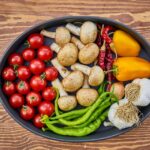Can Diet Change Your Period? Understanding the Link Between Food and Menstruation
For many women, the menstrual cycle can be a frustrating and sometimes painful experience. From cramps to mood swings, it’s not uncommon to wish for a way to make periods less of a hassle. While there’s no magic cure for menstrual discomfort, recent studies suggest that diet may play a significant role in how we experience periods.
So, can diet change your period? The short answer is yes, it can. The foods we eat can impact our hormone levels, which in turn can affect our menstrual cycle. Here’s what you need to know about the link between food and menstruation.
Balancing Hormones with Food
Hormones play a critical role in menstruation. Estrogen, progesterone, and testosterone all have a hand in regulating the menstrual cycle. When these hormones are out of balance, it can lead to irregular periods, heavy bleeding, and other discomforts.
One way to balance hormones is through diet. Eating a diet rich in fruits, vegetables, whole grains, and lean proteins can provide the nutrients your body needs to regulate hormone levels. These foods are also high in fiber, which can help reduce estrogen levels in the body.
On the other hand, consuming too much sugar, processed foods, and unhealthy fats can disrupt hormone levels. These foods can cause insulin resistance, which can lead to an overproduction of estrogen. Too much estrogen can lead to irregular periods, heavy bleeding, and other menstrual issues.
Foods to Include in Your Diet
If you’re looking to balance hormones and improve your menstrual cycle, there are several foods you should consider including in your diet. Here are a few:
1. Leafy Greens – Kale, spinach, and other leafy greens are high in iron, which is essential for healthy blood flow during menstruation.
2. Whole Grains – Whole grains like brown rice, quinoa, and oatmeal are high in fiber and can help regulate hormone levels.
3. Lean Proteins – Lean proteins like chicken, fish, and tofu can provide essential amino acids that help balance hormones.
4. Fruits and Vegetables – Fruits and vegetables are high in vitamins and minerals that can support healthy hormone levels.
Foods to Avoid
While there are many foods that can support healthy hormone levels, there are also foods you should avoid if you’re looking to improve your menstrual cycle. Here are a few:
1. Processed Foods – Processed foods are often high in unhealthy fats, sugars, and additives that can disrupt hormone levels.
2. Dairy – Dairy products contain hormones that can interfere with your body’s natural hormone production.
3. Red Meat – Red meat is often high in saturated fats, which can lead to insulin resistance and hormone imbalances.
4. Alcohol – Alcohol can disrupt hormone levels and lead to irregular periods.
Final Thoughts
While diet alone may not be the solution to all menstrual issues, it can certainly play a significant role. By including healthy, hormone-balancing foods in your diet and avoiding those that can disrupt hormone levels, you may be able to improve your menstrual cycle and experience less discomfort overall.
Remember to talk to your doctor before making any significant changes to your diet, and don’t hesitate to seek medical advice if you’re experiencing severe menstrual symptoms. With the right approach, you can find relief from menstrual discomfort and enjoy a more comfortable, balanced cycle.




